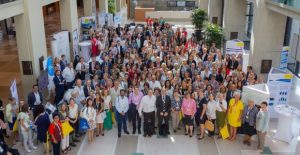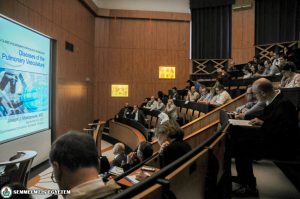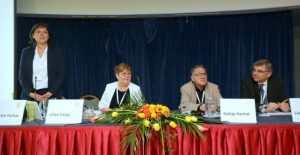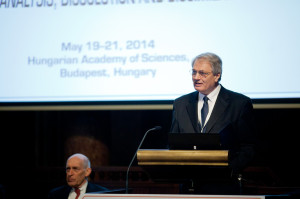 Over 300 participants from 5 continents arrived to the 4th International Regulatory Workshop on A to Z Bioequivalence, Bioanalysis, Dissolution and Biosimilarity (BEW Workshop) which was organised by the Department of Pharmaceutics at Semmelweis University’s Faculty of Pharmaceutical Sciences. At the opening ceremony of the 3 days long workshop – which took place at the Hungarian Academy of Sciences (MTA) – Dr. Imre Klebovich, director of the Department said that the BEW Workshop is considered the most important and most informative educational and training event Europe-wide. Including the 2001 national introductory event, this is the fifth occasion that the forum facilitates the meeting of leading researchers of original and generic pharmaceutical development.
Over 300 participants from 5 continents arrived to the 4th International Regulatory Workshop on A to Z Bioequivalence, Bioanalysis, Dissolution and Biosimilarity (BEW Workshop) which was organised by the Department of Pharmaceutics at Semmelweis University’s Faculty of Pharmaceutical Sciences. At the opening ceremony of the 3 days long workshop – which took place at the Hungarian Academy of Sciences (MTA) – Dr. Imre Klebovich, director of the Department said that the BEW Workshop is considered the most important and most informative educational and training event Europe-wide. Including the 2001 national introductory event, this is the fifth occasion that the forum facilitates the meeting of leading researchers of original and generic pharmaceutical development.
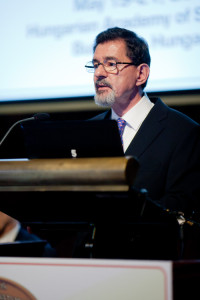 Altogether 34 presentations were held during the three days of this year’s workshop. There were many internationally renowned speakers (including Gordon L. Amiodon, Leslie Z. Benet, Mitsuru Hashida) who also played a role in the development of the official (pharmaceutical) regulations. Dr. Imre Klebovich told the audience that the Hungarian Postal Service issued a unique one-time stamp in honour of the outstanding event. The scientific conference was separately welcomed in a letter by Dr. János Áder, president of Hungary as well as by Dr. József Pálinkás, outgoing president of the MTA.
Altogether 34 presentations were held during the three days of this year’s workshop. There were many internationally renowned speakers (including Gordon L. Amiodon, Leslie Z. Benet, Mitsuru Hashida) who also played a role in the development of the official (pharmaceutical) regulations. Dr. Imre Klebovich told the audience that the Hungarian Postal Service issued a unique one-time stamp in honour of the outstanding event. The scientific conference was separately welcomed in a letter by Dr. János Áder, president of Hungary as well as by Dr. József Pálinkás, outgoing president of the MTA.
[pullquote]internationalisation is one of the most important trends of today’s education which is apparent in research just as much as it is in patient care[/pullquote]In his opening speech, Dr. Ágoston Szél, rector of Semmelweis University, referred to the fact that the participants had come from over 40 countries by emphasising that internationalisation is one of the most important trends of today’s education which is apparent in research just as much as it is in patient care. He underlined that Semmelweis University conducts education in three languages: Hungarian, English and German and that students come to the University from almost 60 countries. The University was granted the “Research University” title for the second time last year and it continuously strives to further strengthen its position in international rankings. The Rector also emphasised the importance of international networking and cooperation which are considerably promoted by scientific conferences.
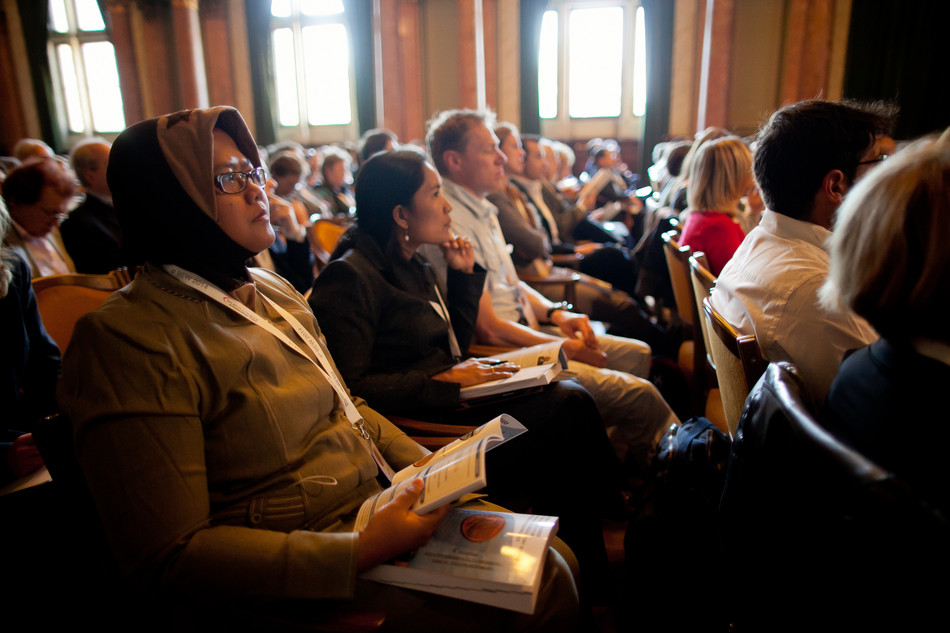 Hilda Kőszegi-Szalai, vice-director of the National Institute of Pharmacy pointed out in her welcome speech that it has become a tradition for the International Regulatory Workshop to forecast the current trends and hot topics of pharmaceutical regulations and research.
Hilda Kőszegi-Szalai, vice-director of the National Institute of Pharmacy pointed out in her welcome speech that it has become a tradition for the International Regulatory Workshop to forecast the current trends and hot topics of pharmaceutical regulations and research.
Participants were also welcomed by Roger L. Williams (former CEO and Chair, Council of Experts, United States Pharmacopeial Convention, UPS), Leslie Z. Benet (Founder President of the AAPS), Clive G. Wilson (Past-President of the EUFEPS), and also by the conference’s co-president, Vinod P. Shah, scientific secretary of the International Pharmaceutical Federation, former president of the AAPS, doctor honoris causa of Semmelweis University.
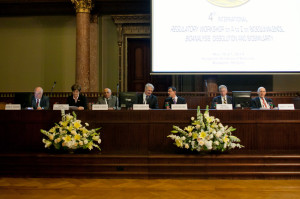 Dr. Imre Klebovich told our website that this event is unique in Europe considering the fact that all of the partners are represented in the fields of pharmaceutical research and development: pharmacists, research institutes, academic researchers as well as national, European and American leaders of pharmaceutical regulatory bodies. Ensuring and developing quality pharmaceutical R&D cannot be achieved without accurately knowing and fulfilling the requirements of the regulatory environment. Representatives of authorities recognised worldwide analysed the questions of bioequivalence, dissolution and biosimilarity and alternatives of biotechnological products (e.g. absorption and the interaction of drugs with alcohol, tobacco and caffeine). Brand new topics were also covered during the workshop such as the new possibilities in gene therapy, bioanalytical methods and the alternatives of biological medications. The latter has brought breakthroughs in the treatment of oncological and autoimmune diseases in the past 10-15 years. Many biological medications’ patents will expire in the near future which makes the introduction of biosimilar products possible.
Dr. Imre Klebovich told our website that this event is unique in Europe considering the fact that all of the partners are represented in the fields of pharmaceutical research and development: pharmacists, research institutes, academic researchers as well as national, European and American leaders of pharmaceutical regulatory bodies. Ensuring and developing quality pharmaceutical R&D cannot be achieved without accurately knowing and fulfilling the requirements of the regulatory environment. Representatives of authorities recognised worldwide analysed the questions of bioequivalence, dissolution and biosimilarity and alternatives of biotechnological products (e.g. absorption and the interaction of drugs with alcohol, tobacco and caffeine). Brand new topics were also covered during the workshop such as the new possibilities in gene therapy, bioanalytical methods and the alternatives of biological medications. The latter has brought breakthroughs in the treatment of oncological and autoimmune diseases in the past 10-15 years. Many biological medications’ patents will expire in the near future which makes the introduction of biosimilar products possible.
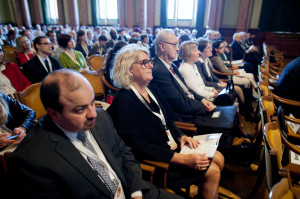 Dr. Imre Klebovich emphasised that the organisation of the international BEW Workshop in Hungary has considerably increased Semmelweis University’s, the MTA’s and the Hungarian pharmacology’s and drug production’s international recognition and prestige.
Dr. Imre Klebovich emphasised that the organisation of the international BEW Workshop in Hungary has considerably increased Semmelweis University’s, the MTA’s and the Hungarian pharmacology’s and drug production’s international recognition and prestige.
The workshop was co-organised by the MTA’s Section of Medical and Chemical Sciences, the Hungarian Society for Pharmaceutical Sciences and several international scientific pharmaceutical organisations including the European Federation of Pharmaceutical Societies (EUFEPS).
Pálma Dobozi
Photos: Attila Kovács, Semmelweis University
Translated by: Bonifac Makkai
